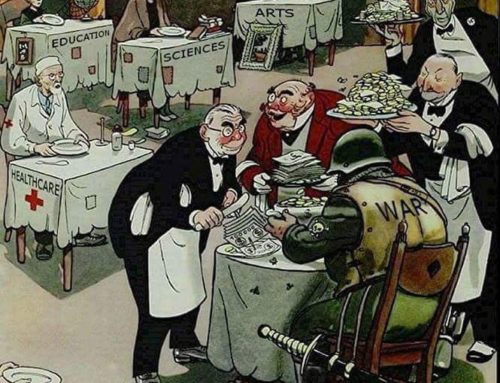June is both #PrideMonth and #CaribbeanHeritageMonth, we at @seedsofunity have decided to share stories of notable LGBTQ+ and Caribbean anti-imperialist/ anti-capitalist theorist & organizers of movements past. We have compiled the stories of four notable leaders from each group; Maurice Bishop, Sylvia Rivera, Claudia Jones, and Leslie Feinberg. Here are their stories. All of the people featured may be controversial in various ways, and have made many mistakes but it’s important to note we organize around ideas and not people. While the people themselves maybe flawed the ideas many of these theorist came up with, and executed were inspiring. They serve as reminders from a near distant past what we are capable when we organize. Please reach out and inquire about organizing with us if this resonates with you or even if you have criticisms.
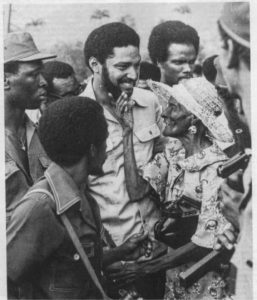
Caribbean Heritage Month Feature:
#MauriceBishop
#MauriceBishop of the Grenada Revolution and the leader of New Jewel Movement , self proclaimed a Marxist–Leninist party which sought to prioritize socio-economic development, education, and black liberation on the Caribbean island of Grenada. Ronald Reagan saw Bishop as a threat because he wasn’t just a leftist, but he aligned most of the Grenadian government’s social programs to Cuba and Nicaragua’s liberation movements. The U.S. government also recognized the potential and feared his influence; seeing as Bishop was English speaking was actively giving speaking tours around the US.
.
Maurice Bishop organized a bloodless coup against the U.S.-backed imperialist puppet regime of Eric Gairy in March 1979. Bishop was well known for his charisma, patience, oration skills, and his ability to connect with the people. Prior to getting involved in political organizing he participated in many anti-Eric Gairy protest as Grenadians were dissatisfied with his puppet leadership, secret police force and violent repression. He also gave free legal defense to striking nurses at the island’s main hospital. Bishop led the People’s Revolutionary Government of Grenada (New Jewel Movement) in a series of policies to favor the masses. Bishop intentionally set out to connect with the working class after several failed attempts to organize them prior to his revolution.
.
Bishop realized his movement was not resonating with the masses. With his comrade’s, he developed a new strategy, shifting focus from propaganda and mobilization for anti-government demonstrations toward organization of party groups and cells, and introducing the masses to a political education. ***This shift in approach demonstrates a flexible and responsive approach to organizing, when their attempts were failing to resonate with the masses Bishop and his comrades sprang into actionable practices; organizing the people; educating them instead of hammering them with more theory or encouraging them to protest without understanding. This is the necessary balance revolutionary’s must learn to straddle; Theory and Practice must go hand in hand. ***
.
His government introduced free public health, provided people with schooling programs that reduced illiteracy from 35% to 5%, and reduced unemployment from 50% to 14%. Workers’ and women’s rights were at the core of the policies together with the fight against racism, apartheid, and imperialism. Under Bishop’s leadership, the National Women’s Organization was formed which participated in policy decisions along with other social groups. Women were given equal pay and paid maternity leave, and sex discrimination was made illegal.
.
Internal strife, the result of a tragic split within the governing New Jewel Movement resulted in a coup. The coup against Bishop and his later execution provided the excuse for the U.S. to invade the Grenada on October 25, 1983, ending the four-year socialist experiment on the small Caribbean Island. On October 14, 1983, Bishop was overthrown by former comrad Bernard Coard, sparking protests that drove to the street reportedly a large portion of Grenada’s population. On the 19th, Bishop, members of his cabinet, and some supporters were tortured and executed by a firing squad.
.
The official statement from the Cuban government after learning about Bishop’s assassination was painfully predictive. “Now imperialism will try to use this tragedy and the serious mistakes made by the Grenadian revolutionaries to sweep away the revolutionary process in Grenada and place the country under imperial and neocolonialist rule once again.”The Grenadian revolution although short lived must be remembered. The successes of its revolutionary process and social achievements of it continue to inspire anti-imperialist organizers around the world. The legacy of Maurice Bishop and the New Jewel Movement must be kept alive.
.
“When will imperialism learn? Yes, they can kill our bodies but they can never kill the spirit of a people fighting for their liberation, they can never kill the spirit of a people fighting for their country and fighting to push their country forward.” – Maurice Bishop
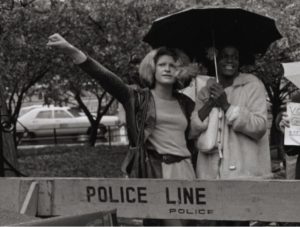
Pride Month Feature:
#SylviaRivera
Sylvia was on the ground resisting at the 1969 #StonewallInn uprising alongside her comrade and close friend #MarshaPJohnson. Sylvia was a continuous distributive voice bringing demarcation throughout her life, she fought against the exclusion of transgender people, especially transgender people of color, from the larger movement for gay rights as well as capitalist co-opting of #PrideMonth. We uphold her example of demarcation, especially her fighting against the respectability politics that are so often used to undermine people fighting in their own interests.
.
Born in New York to a Puerto Rican mother and Venezuelan father and orphaned at 3, she was assigned male at birth and later taken in by her maternal grandmother. She endured abuse from her grandmother and schoolmates for experimenting with gender expression, leading her to run away at age 11 and getting caught into a network of sex work and exploitation.
.
In 1963, Rivera met Marsha P. Johnson. This transformed her life and activism. Johnson, an African American self-identified drag queen activist, was also fighting exclusion within the gay rights movement that did not embrace their gender expression. The pair would be at the heart and center in the Stonewall Inn uprising on June 28, 1969 when patrons of the Stonewall Inn (a gay bar in Greenwich Village in lower Manhattan) combatively refused a police raid setting a new more radical tone for the gay rights movement. Rivera is famous for throwing a Molotov cocktail at police.
The then 17-year-old Rivera refused to go home or to sleep, saying quote “I’m not missing a minute of this—it’s the revolution!” She stayed put for six days mobilizing against police. Rivera resisted arrest and led a series of protests against the raid in its aftermath.
.
The Stonewall Inn uprising was a turning point in the visibility of the gay rights movement making headlines across the nation. Pride parades started soon after in 1970, but Rivera and other transgender people were discriminated against and discouraged from participating. In 1973, Rivera participated in the Gay Pride Parade but was prohibited to speak, despite the amount of advocacy work she was doing. She grabbed the microphone anyway, telling the crowd, “If it wasn’t for the drag queen, there would be no gay liberation movement. We’re the front-liners.” She was booed off the platform stage. During the 1970s, she frequently was at odds with gay rights leaders who were reluctant to include transgender people in their fight. The Gay Activist Alliance (GAA), which formed in response to Stonewall, frequently rejected the role transgender people(many of whom were people of color) had played in Stonewall itself. Sylvia constantly demarcated and demanded inclusion for trans BIPOC, homeless street kids and drag queens. She advocated for those who were in the LGBTQ+ community but weren’t concerned with playing into respectability politics: **this teaches us to constantly fight opportunism and draw clear lines to demarcate from within any movement that is not including entire spectrum of its oppressed masses.**
.
“We have to be visible. We are not ashamed of who we are.” — Sylvia Rivera
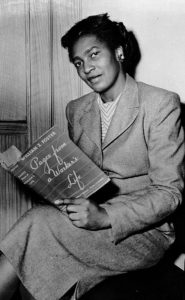
Caribbean Heritage Month Feature:
#ClaudiaJones
Claudia Vera Cumberbatch was a Trinidad- and Tobago-born journalist and activist. As a child, she and her family moved to America where she became a Communist political activist, feminist and Black nationalist, adopting the name Jones as “self-protective pseudonym” due to rabid political persecution of Communists and unfettered McCarthyism in the US. She wasn’t paranoid in doing so, for she was eventually deported from the US in 1955. Jones then settled in the United Kingdom. Once arriving in the UK, she immediately joined the Communist Party of Great Britain, of which she remained a life long member. She then founded Britain’s first major Black newspaper, the West Indian Gazette, (WIG) an anti-racist newspaper campaigning for social equality. This was Britain’s first commercial Black newspaper. WIG sought to unite West Indians in diaspora and to foster dialogue with Black international anti-imperialist freedom movements. The paper also highlighted patterns of anti-Black violence, racial harassment, and prejudice in the UK in 1958. She also played a vital role in founding the Notting Hill Carnival, the second-largest annual carnival in the world.
.
Prior to her deportation Jones was active in trying to transform American society. However, Jones grew frustrated with her life in America. Despite being extremely academically gifted, being classified as a black female immigrant severely limited Jones’ career choices. Unable to go to college she began working in a laundromat, and then performed retail work in Harlem.
.
In 1936, she joined the Young Communist League USA. The American communist movement’s opposition to the Italian invasion of Ethiopia, was another factor which prompted Jones to join the communists ***Jones always held an anti-imperialist line, having solidarity with oppressed peoples internationally as well as here at home**.* As a member of the Communist Party USA and a Black nationalist and feminist, Jones’ main focus was on creating “an anti-imperialist coalition, managed by working-class leadership, fueled by the involvement of women.”
.
In 1937 she joined the editorial staff for agitation and newsletters for the many incarnations of the Communist Party USA. ***Jones never let her lack of higher education stop her from writing, editing and bringing perspective in agitation and propaganda, while studying theory and scholarship is helpful if should not create a barrier between bringing perspective to the masses.*** Jones became executive secretary of the Women’s National Commission, secretary for the Women’s Commission of the Communist Party US.
.
Jones’ best known piece of writing, “An End to the Neglect of the Problems of the Negro Woman!”, appeared in 1949 in the magazine Political Affairs. It displays Jones’ development of what would much later came to be widely as termed “intersectional” analysis within a Marxist framework.
.
***While this account demarcates from identity politics, or organizing solely on the basis of sex, gender, or race without that organization being rooted in class consciousness, we see Jones as an example of someone who brought anti-imperialist sentiment & theory to her work as an activist. We appreciate her example as an outspoken anti-imperialist because she was able to make connections between oppression on different fronts, showing that imperialism connects our struggles.***
.
“Imperialism is the root cause of racism. It is the ideology which upholds colonial rule & exploitation. It is the ideology which breeds fascism, rightly condemned. by the civilized people of the whole world.” -Claudia Jones
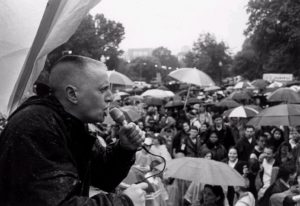
Pride Month Feature:
#LeslieFeinberg
Leslie Feinberg was a self professed “anti-racist white, working-class, secular Jewish, transgender, lesbian, female, revolutionary communist.” Leslie was also an author and author. One of hir most notable works being Stone Butch Blues (1993) and hir pioneering non-fiction book Transgender Warriors (1996), was instrumental in bringing these issues to a more mainstream audience and terminology awareness into public discourse. Feinberg’s writings on LGBT history, “Lavender & Red”, frequently appeared in the Workers World newspaper as well.
.
When Feinberg was in hir 20’s they became affiliated with the Workers World Party. Workers World Party (WWP) is a revolutionary Marxist–Leninist communist party founded in 1959 after splintering from the Socialist Workers Party (SWP). Feinberg first joined the Buffalo chapter and after moving, became active with their NYC chapter. Feinberg took part in countless anti-war, anti-racist, pro-Palestine and pro-labor demonstrations on behalf of the party for many years. Feinberg began writing for them starting as the editor of the political prisoners page of the Workers World newspaper for fifteen years, and eventually in 1995, became the managing editor for the entire newspaper.
.
Feinberg’s first novel, the 1993 Stone Butch Blues, covers topics related to union organizing and political activism in her real life, making Stone Butch Blues a political piece in addition to an LGBT work. The novel is also a significant work for many labor organizers, listed by many as essential LGBT and labor history reading. Much of the aspects of the work draw from Feinberg’s earlier experiences living in Buffalo before moving to NYC and worked mostly in low-wage and temporary jobs, including washing dishes, cleaning cargo ships, working as an ASL interpreter, inputting medical data, and working at a PVC pipe factory and a book bindery. Feinberg was intimately acquainted with the ways workers were disregarded and needed to unionize.
.
Stone Butch Blues is widely considered worldwide to be a groundbreaking work that describes the complexities of gender. Feinberg was the first theorist to advance a Marxist concept of “transgender liberation.” It sold thousands of copies and also passed from hand-to-hand inside prisons, Stone Butch Blues has been translated into Chinese, Dutch, German, Italian, Slovenian, Turkish, and Hebrew (with hir earnings from that edition going to ASWAT Palestinian Gay Women). The novel was winner of the 1994 American Library Association Stonewall Book Award and a 1994 Lambda Literary Award.
***Hir work reminds us that despite our individual identities that do come with unique struggles, all our struggles need to be connected class consciousness, especially when we organize to effect change. We organized around a political line that applies to people of all identities and is rooted in understanding of class struggle.***
.
Feinberg died on November 15, 2014, of complications due to multiple tick-borne infections, including “Lyme disease, babeisiosis, and protomyxzoa rheumatica,” a long-lasting condition that affected Leslie since the 1970s. Feinberg’s last words are reported to be, “Hasten the revolution! Remember me as a revolutionary communist.”
.
“Like my own life, this novel defies easy classification. If you found Stone Butch Blues in a bookstore or library, what category was it in? Lesbian fiction? Gender studies? Like the germinal novel The Well of Loneliness by Radclyffe/John Hall, this book is a lesbian novel and a transgender novel—making ‘trans’ genre a verb, as well as an adjective . . .”
-Leslie Feinberg

